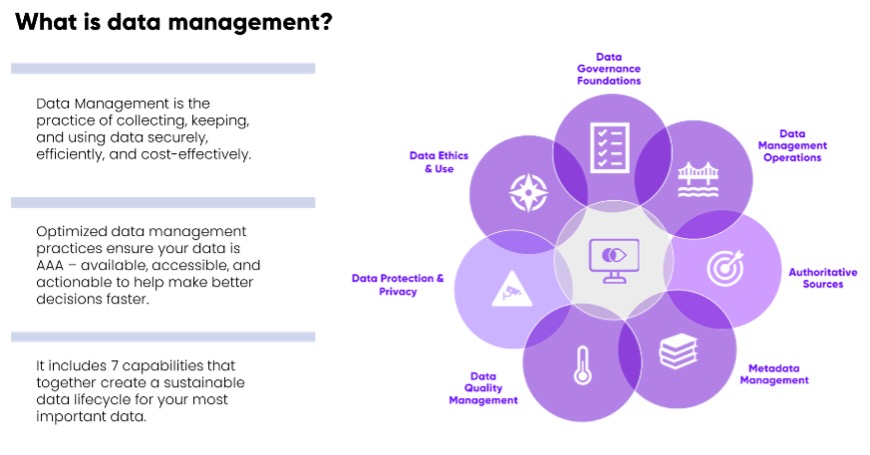Data Management
Data Management is alive and well! How do I know? Because participation in our inaugural Data Management Roundtable was oversubscribed. I was joined by CDOs and Data Leaders from a multitude of sectors including banking, insurance, entertainment, education and the public sector, from North America and the UK, for a frank discussion.
The state of Data Management today
Our conversation focused on the main challenges in successful data management initiatives today. There were two clear winners.
Getting buy-in from leadership remains the perpetual top challenge.
Despite the collective years of experience this group of experts has (of working to design, simplify, and enhance data management and governance foundations), data leaders still struggle with getting their leaders, peers and colleagues to fully buy-in and understand that data management is a business process that needs to be funded, sustained and improved continuously. It is not a project or program that has a finite end date.
Investing in a data management strategy and all its capabilities, skills, and tools – with the recognition that it is a core business process – is critical to making your business thrive on data.
So, what are some of the best ways to get buy-in from leadership? A few ideas to get started…
- Design your data management strategy around solving operational problems that can help win or retain clients, reduce operating costs, or minimize enterprise risk. Find a few trusted insiders – business people in key functions within your organization who believe in the data cause – and share with them real data stories that have created favorable outcomes in these operational areas. And then ask them to tell that story to their teams, peers and leaders. It might seem slow to start but winning one heart and one mind at a time leads to a multiplier effect for cultural change.
- Start small and meaningful and recognize you cannot take it all on at once. Focus on what is important to business strategy and the stated outcomes so that you can learn, expand your impact and eventually scale to a broader use case.
- Create a formal communication plan with targeted stakeholders, key messages, media, and cadence. Investment in communication excellence is money well spent.
Coming in a close second…How to retain and attract the “right” talent for the time?
This is no easy task in today’s flexible work environment. But we all know people are at the heart of the data journey, so this is where to focus your time. Some quick tips:
- Help establish up-skilling programs with your learning and development teams; and ensure your teams create action plans to enhance their data skills.
- Create (or share) a library of free on-line trainings and share broadly across the organization since data is everyone’s job, not just the data team.
- Don’t hire your data scientists unless accompanied by a robust data management strategy and processes; they get frustrated when they become the Data Quality gurus instead of the brains behind the science.
But we didn’t get to cover technology for data management which merits a separate discussion
While tools and technology are rarely where we should start a data management strategy, technology must be considered when shaping the holistic solution.
Lucky for us, there are new technologies that can accelerate and automate previously manual, tedious, often expensive data management tasks such as data lineage and cataloguing. But don’t just pick the shiny new one. Take the time to evaluate your needs in light of your business objectives. Keep scale at top of mind as you choose, and look for modular components that can plug and play and be adapted overtime.
At Cynozure, our approach to creating a data management strategy is holistic.

It covers the full spectrum of capabilities needed to be successful (including getting buy-in and attracting and retaining talent!). But we cover so much more. We’ll continue to explore these capabilities in detail over the next few months; including what’s new in modern data management with AI, what techniques and tools are most useful for launching a data quality program, how are we integrating new data sets such as ESG, to name a few. We are looking forward to your active participation in future events, and would love to have your input to the conversation.
In the meantime, if you’d like to find out more about our framework for, and expertise in, Data Management, you can download our Data Management Whitepaper, or contact us and we’ll be happy organize a session to discuss it in more detail.








